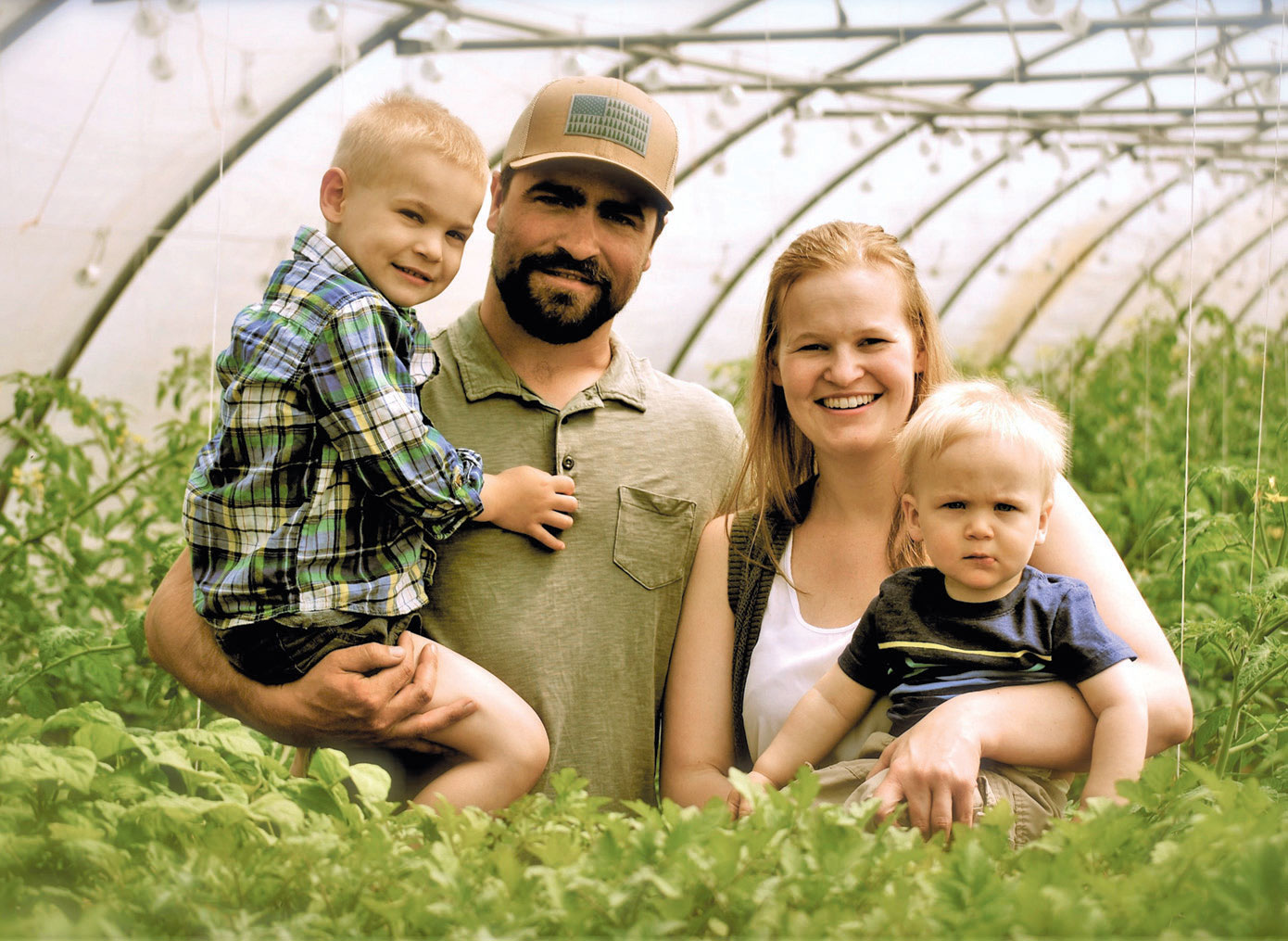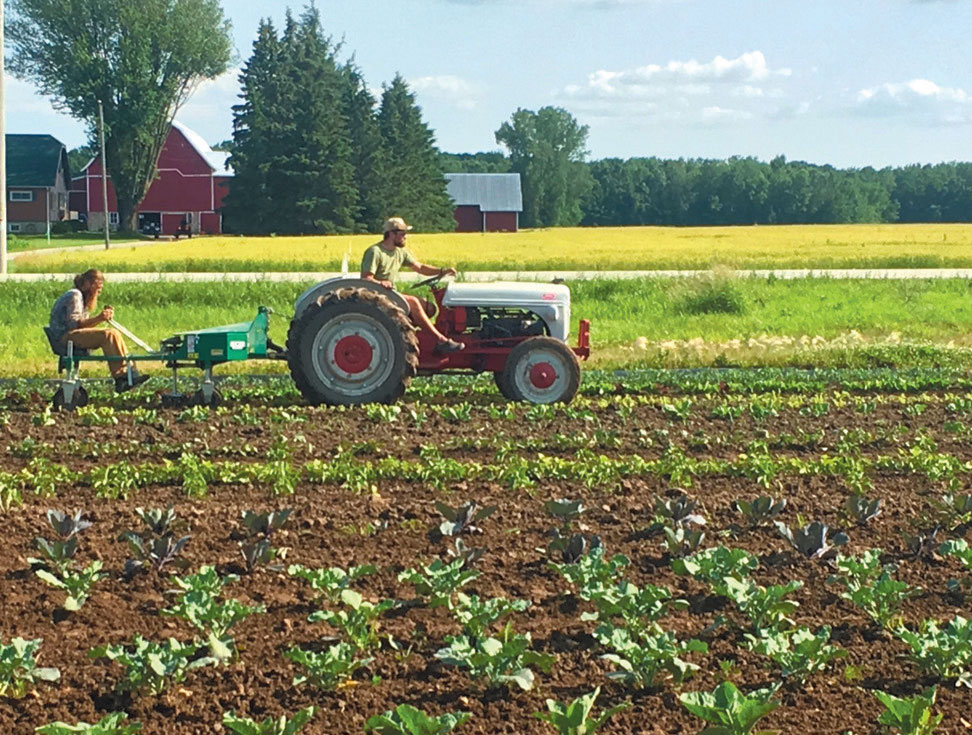The Many Facets of Twin Elm Gardens In Pulaski
Farm’s impact felt well beyond Twin Elm Drive
Luke Wojcik is like the mail carrier of farming. He aims to deliver fresh produce in rain, sleet, snow ... winter, spring, summer and fall.
It’s a reputation he’s earned. Whether it’s shoveling through seven-foot snow drifts to greenhouses holding tender young plants destined for local restaurants or sinking in mud up to his calves while harvesting food for CSA boxes, Wojcik is committed to putting fresh, local produce into his customers' hands.
Luke and his wife, Melissa, own Twin Elm Gardens located on Twin Elm Drive, just east of Pulaski. Founded in 2008 on land that had been in his family since the 1890s, Twin Elm Gardens is a seven-acre, chemical-free farm producing salad greens, vegetables, herbs, fruits and a wide assortment of microgreens. They also raise broiler chickens, egg-laying chickens and pigs.
Melissa, who was Luke’s high school sweetheart, takes care of accounting, social media and IT support for the farm. That’s in addition to being a science teacher at Bay View Middle School. They have two children, Henry, 5, and Griffin, 2.
While Twin Elm Gardens focuses on supplying restaurant chefs and their CSA customers, it can also be found at the Wednesday Broadway and Saturday farmers markets in Green Bay and the winter farmers markets. Baby sunflower greens, pea shoots and other microgreens can be purchased at a handful of locations in the Green Bay area.
Twin Elm Gardens produce has also earned its spot by name on many local restaurant menus, finding itself featured in some signature chef dishes. Branding of local produce is not an easy task considering chefs require a steady supply of ingredients.
Speaking to the success of Twin Elm Gardens, Wojcik said he never wanted to close their doors in the winter months, so he focused on year-round production.
“We are up against grocery stores where it is July every day of the year for customers,” he said. “If I disappear four or five months during the cold season, who’s to say somebody isn’t going to come to my customers and take my place? “When I first got started building relationships with restaurants and customers, I made sure I had some form of food I could sell every week to stay on those menus in those restaurants,” he said.

Luke and Melissa Wojcik, owners of Twin Elm Gardens, with their sons Henry and Griffin.
That tenacity has paid off. Patrons in the Green Bay area will find Twin Elm Gardens items gracing the menus in over a dozen restaurants, including Copper State Brewing Company, Rustique Pizzeria, Kavarna Coffeehouse and more.
“When I am building relationships with chefs, I look for ones who are committed to the local scene,” Wojcik says. “I look for chefs who have the creativity, skill and willingness to be flexible to take whatever vegetables or fruit I have available that week and turn it into great dishes for folks.”
The highest demand is for their greens, he says. Twin Elm Farms grows a number of lettuce varieties along with greens like kale, arugula, spinach and microgreens like baby brassica, baby kale, basil, mustard greens and cilantro. Its salad blend is its most popular product, and customers seem to be particularly attracted to his greens in the winter season.
“You wouldn't think lettuce and spinach could survive the cold, but it can,”he says, noting the deeper flavors that develop in cold-grown greens.“Every vegetable benefits from an environment with no heat stress, just like humans.”
Wojcik likes to educate consumers about all that goes into producing a crop like greens year-round, especially if those customers blink at the higher price tag on locally-grown winter produce.
“In the winter time, it might be minus-20 degrees with wind chill.Farming at that time of year is inherently more laborious,” he explains.
“We have heat and water to get to the greenhouses. There are snowstorms. Things break. Things have to be fixed.There is more to it than meets the eye to keep produce growing.”
Certainly one aspect of farming that Wojcik keeps his eye on is the health of his soil. Explaining his focus on organic principles and trace minerals, Wojcik acknowledges that contrasts with conventional agriculture’s emphasis on the big three elements of nitrogen, phosphorus and potassium. Instead, he says, it is “the whole periodic table of elements” that needs to be taken into consideration to produce nutrient-dense food.
Twin Elm Gardens also utilizes composting, rests land in rotation and uses green manure. Wojcik explains that “green manure” is when a crop like winter rye is planted in the fall and left in the ground over the winter for ground cover. In spring that winter rye would then be tilled back into the soil, providing mulch and recycled nutrients for the next crop.
While the Wojciks are very serious about the business side of his farming, their farm has also become a place to raise their children. He says at age 5, his oldest son Henry is getting his feet wet in farming by becoming the “No. 1 dad watcher” and lover of tractors.
“He likes to collect eggs and will help plant potatoes by putting them in the holes,” Wojcik says. “Henry loves strawberry season, but he pretty much eats everything he picks.”
Much like his sons, Wojcik said his own love for gardening started early. “When I was a kid, I would think, ‘Hey, this is pretty fun picking my own beans and peas for supper.’”
Wojcik continued that love for growing plants and after high school began to piecemeal his farming education together.
“I got my street smarts by working at local market gardens in the summer and teamed that with learning the science of growing at college,” he said.
In those summers home from college, he was already growing produce of his own while learning about organic farming methods and nutrient dense food principles on the market gardens he was working for. He went on to graduate from UW-Platteville in 2010 with a degree in horticulture with an emphasis in business management.
Sometimes the sustainable growing methods Wojcik had learned back home contrasted with the conventional perspective on agriculture that he was being taught at the university.
“I tried not to be too biased,” he said. “At times the education was completely opposite of what I had learned locally. I would take and leave what I wanted. But even learning conventional methods, there were plenty of tidbits in there to help me.”
At graduation, Wojcik said he was faced with the question of getting a standard 9-to-5 job or going all in on farming. His choice? He went the farming direction and says he hasn't looked back. As Wojcik has continued to invest in his farm operation, he appreciates the advancements in equipment designed for small market farms like Twin Elm Gardens.
“The younger generation is really engineering up some amazing equipment for ergonomics and sustainability,” he says. “This is well-designed equipment that can help with planting, weeding, cultivating, harvesting and washing produce. It can make smaller farms feel a lot bigger in terms of production.”
One of Wojcik's recent equipment acquisitions is his “paper chain pot transplanter” designed and made in Japan. The transplanter takes trays of small seedlings and can plant a precisely-spaced 96-foot row of lettuce in about a minute.
“It has revolutionized our production. It is a thing of beauty,” he says. “When I am transplanting with that equipment, I just have a smile on my face the whole time.”
It's no wonder he’s smiling when one looks at the volume of plants in just one of Wojcik's greenhouses that measures 30 feet wide by 96 feet long. Inside are 460 tomato plants in rows, and at their feet are banked rows of lettuce plants numbering around 6,500.
It’s that type of maximization of space that has allowed Twin Elm Gardens to support their average 50 CSA customers each year on just seven acres. Wojcik understands that CSA customers have many good local farms to pick from when purchasing a CSA and offers this advice to those shopping for CSA shares: “You have to find a farmer you like. In reality, you are buying me. You are buying Luke. You are buying my wife and kids. This is what we do.
“You have to be comfortable with your farmer and what their packages contain,” Wojcik continued. “Each week, in addition to the basics, I like our boxes to contain some extended stuff: celeriac, fennel, Asian greens, radicchio, heirloom tomatoes, parsnips, blue flesh potatoes, red flesh potatoes – one or two surprises each week.”
Wojcik, who says if he wasn't farming he would probably be working in a kitchen, tells consumers to open themselves to new food experiences.
“Get out of the grocery store and out of your comfort zone,” he encourages. “Expose yourself and your children to something new. Teach your 7-year-old what a celeriac bulb is and how to slice it for a salad or onto their sandwich.”
Wojcik takes pride in his farm’s role in developing local, sustainable food systems. He says, “At the end of the season, I want my customers to realize they are a better cook because I challenged them to prepare new foods.”
For more information on Twin Elm Gardens, along with where to find their produce, go to: twinelmgardens.com.




